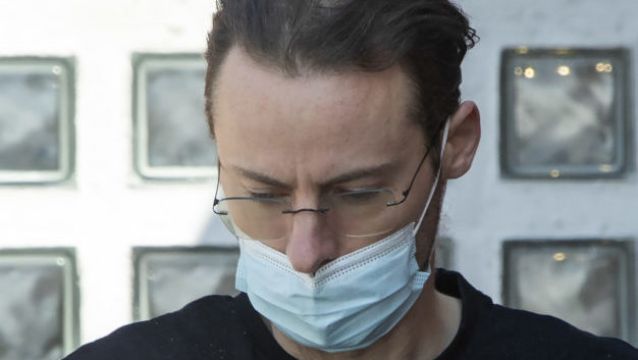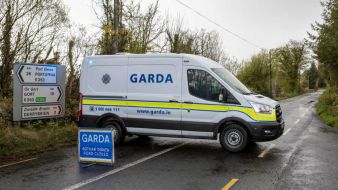A 32-year-old man who was suffering from schizophrenia when he killed his father with a second World War bayonet on Father's Day has been found not guilty of murder by reason of insanity.
The Central Criminal Court jury in the trial of Gareth Sheeran, of Carriglea View, Firhouse, Dublin, deliberated for just 42 minutes before returning their unanimous verdict on Friday to Mr Justice Tony Hunt.
Mr Sheeran had pleaded not guilty by reason of insanity to the murder of his father, Harry Sheeran (65) at the same address on Father's Day, June 20th, 2021.
The jury heard evidence from two psychiatrists who agreed that Mr Sheeran was suffering from a mental illness, namely schizophrenia, and did not know that what he was doing was wrong when he killed his father.
Mr Justice Hunt thanked the panel for their service in the case and exempted them from jury service for a period of seven years.
He said the case was a “tragedy for all concerned” and said his thoughts went out to the Sheeran family and particularly the accused’s mother who had lost her husband. “This can’t be an easy process for them,” he said.
The trial had heard that when the gardaí arrived at the house on the night of the killing, they found Harry Sheeran lying on the ground in a large pool of blood that was around his waist and feet. They also saw blood on the defendant’s legs and t-shirt.
Detective Garda Austin Larkin gave evidence that when the gardaí asked what had happened, the defendant said: “I was upset. I attacked him.”
The detective said that the defendant told gardaí he stabbed his father with a “WWII bayonet-type of thing”.
Commotion
Det Gda Larkin told the court that a man renting a room in the house from the deceased said that some time before the stabbing, he was in his room wearing headphones, but he thought he heard someone beating Gareth Sheeran up in the next room.
He said he heard the defendant say, “Get off, get off, leave me alone”, but there was no one else in the room with Mr Sheeran.
Det Gda Larkin also said that a next-door neighbour said she heard things being thrown, “like furniture rumbling”, but she did not hear anyone saying anything. She said it sounded like “someone fell out of the attic”, and she said she then heard “a wail of anguish”.
The court also heard evidence that a post-mortem examination conducted by Dr Heidi Okkers, found stab wounds to Harry Sheeran's chest, two wounds on his back, two on his left arm, and one to the right leg.
Dr Okkers said Harry Sheeran experienced multiple sharp force injuries, and one stab wound caused injuries to his heart. The pathologist said there was significant blood loss from the leg wound, and the victim's death occurred through stab wounds to the chest and leg.
In his charge to the jury on Friday, Mr Justice Hunt said “the evidence points all in one direction in this case”.
He said expert evidence had been heard from two very experienced psychiatrists who both agreed Mr Sheeran was suffering from a mental disorder at the time of the killing and that he fulfilled the criteria that entitled him to the special verdict of not guilty by reason of insanity.
Mr Justice Hunt pointed out that the defence had contended there was “abundant evidence” that Mr Sheeran was suffering from a mental illness for many years before this event occurred.
He said there seemed to be “absolutely no reason to doubt” that Mr Sheeran suffered from a mental disorder as defined by the Act.
Special verdict
“If you are agreed the appropriate result at the end of the day is that Mr Sheeran was suffering from a mental disorder and that he fulfilled one of the three criteria [that he did not know the nature of the act, did not know it was wrong or could not refrain from doing it] then he is entitled to the special verdict,” Mr Justice Hunt told the jury.
On Friday morning, Dr Ronan Mullaney, a consultant Forensic Psychiatrist at the Central Mental Hospital called by the defence, gave evidence to Eilis Brennan SC, for Mr Sheeran, that the defendant suffers from schizophrenia and was most likely suffering from acute psychosis at the time of the killing.
He said this psychosis would have led to a significant impairment of Mr Sheeran’s mental functioning and his control at the time would have been circumscribed by his belief that he was at imminent risk of death.
He said it was his opinion that, following the evolution of a complicated psychosis, Mr Sheeran believed the victim was planning to have him killed on the night of the offence.
The doctor said if the accused believed that was the case, then it was probable he did not know what he was doing was wrong.
Dr Mullaney said in his expert opinion, Mr Sheeran satisfied all three of the possible criteria for a defence of not guilty by reason of insanity.
Dr Patrick McLaughlin, a consultant forensic psychiatrist based in the Central Mental Hospital, previously told the court that Mr Sheeran suffers from a major mental illness, namely schizophrenia.
He said that at the time of the killing, Mr Sheeran’s mental illness had been untreated for three years, that he was more than likely suffering a relapse of schizophrenia and the symptoms were present at the time of the killing.
He said that Mr Sheeran had a long history of believing he was being targeted and he had the unusual belief that killing his father would help him in some way.
Clear evidence
Dr McLaughlin gave evidence that the defendant told him about an event in 2018 in the Phoenix Park, when he said he was approached by two men.
Dr McLaughlin said it was very difficult to follow the narrative being put forward by Mr Sheeran, but it appeared that on this occasion the defendant believed he received information about his father, with someone saying to him: “Kill your father, we’ll help you.”
Dr McLaughlin said the defendant was quite incoherent in this account, but he was not being “wilfully incoherent”.
In his closing remarks to the jury, prosecuting counsel James B Dwyer SC said the evidence “speaks for itself”. “It's very clear evidence and it is evidence that is in no way in contention between the prosecution and the defence,” he said.
Counsel said the jury could be satisfied beyond reasonable doubt that Gareth Sheeran killed Harry Sheeran.
He said in that context the burden of proof shifted to the defence to prove that Gareth Sheeran was suffering from a mental disorder, namely a relapse of his schizophrenia, as a result of which he did not know the nature and quality of his act or that what he was doing was wrong.
He said the jury had heard from two very eminent psychiatrists who were in agreement that Mr Sheeran was suffering from a relapse of his mental disorder at the time of the killing.
In her closing address, Ms Brennan said Gareth Sheeran had admitted carrying out the offence.
She asked the jury to focus on the "true issue" in the case, which was that Gareth Sheeran was suffering from a mental illness at the time he committed the offence.
“You've heard from two psychiatrists who are of the view that Mr Sheeran was very unwell at the time he committed the offence and had been unwell from 2014," she said.
Counsel said in order to fulfil the criteria for a not guilty by reason of insanity verdict, the defence had to prove Gareth Sheeran was suffering from a mental disorder at the time. She said the two psychiatrists in the case have each agreed that Gareth Sheeran fulfilled any one of the three criteria for a special verdict.
“Any one would be sufficient, but both psychiatrists are of the view that he fulfils the criteria for all three,” she said. “I would ask you to bring in a verdict of not guilty by reason of insanity.”
Mr Justice Hunt adjourned the matter to Friday, August 25th.







